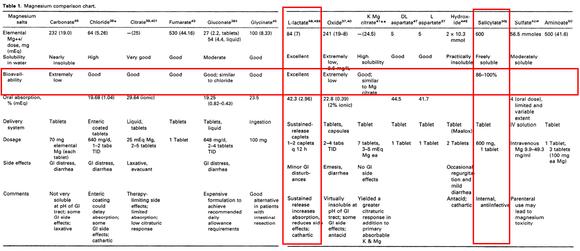Most people can benefit from a magnesium supplement. Not all supplements are equally good though, in fact a lot of them are just plain bad.
The basics
- Magnesium is used by 300+ enzymes
- ATP (energy molecule in cells) doesn't function unless bound to magnesium
- Depending on the study/book, 60 to 80% of people get too little of it
- Magnesium bioavailability (how much is absorbed) varies greatly per type
- Magnesium Oxide is absorbed for 10% only. Don't take it.
Magnesium bioavailability matters
Bioavailability it the extent to which a substance is absorbed and enters the bloodstream without being altered. Consider an example:
- A rock has low bioavailability, if you eat one it won't be absorbed to the bloodstream
- A sugarcube has high bioavailability, eating one will spike your blood sugar
- Note to the geeks: yes, you could argue that the sucrose is pre-processed before absorption into the blood if you take the definition like a grammar nazi The case for magnesium is no different. Cheap forms of magnesium (like magnesium oxide) are more like a rock than a sugar cube.
So what magnesium supplement is best absorbed?
The problem with questions like this is that there is very little reliable data. Most of it comes from animals. We can say the following though:
- Magnesium Oxide is bad
- Magnesium citrate is reasonably good
- Magnesium lactate is excellent
- Absorbtion rate seems to be linked to how well the powder solves in water I base this on a comparative research paper. The image below is a modified version of their results table. I highlighted the best variants.
The european food safety authority (EFSA) quotes similar results in an inquiry (EFSA-Q-2004-066) into magnesium aspartate. They concluded L-Lactate, L-Aspartate and choride to be similar in bioavailability. They also marked oxide as the worst.
So what should you take?
When I first researched what magnesium supplement is best absorbed, I found that many Dutch health stores sell Magnesium Oxide (shame on you drugstores). Between absorption rates and availability I settled on Magnesium Lactate. It's available as a powder that solves very well into tea and has a mildly sweet taste because of the lactate. Note: I recommend taking magnesium combined with vitamin d. Perhaps I'll write on that later.

